- Home
- Anthony Doerr
Memory Wall: Stories Page 4
Memory Wall: Stories Read online
Page 4
Alma’s neck sags; her knees drift apart. Pheko goes downstairs to eat a slice of bread. Wind begins thrashing through the palms in the garden. “Southeaster coming,” says the kitchen television. Then ads flicker past. A tall white woman runs through an airport. A yardlong sandwich scrolls across the screen. Pheko closes his eyes and imagines the wind reaching Khayelitsha, boxes cartwheeling past spaza shops, plastic bags slithering across roads, slapping into fences. People at the station will be pulling their collars over their mouths against the dust.
After a few more minutes, he can hear Alma calling. He walks upstairs, sits her back down, and pushes in the same cartridge again.
CHEFE CARPENTER
Friday Roger shepherds Luvo up a sidewalk in front of a different house than Alma Konachek’s, on the opposite side of the city. The house is wrapped by a twelve-foot stucco wall with broken bottles embedded in the top. Nine or ten eucalyptus trees stand waving above it.
Roger carries a plastic sack in one hand with something heavy inside. At a gate he looks up at a security camera in a tinted bubble and holds up the sack. After perhaps ten minutes a woman shows them through without a word. Two perfumed collies trot behind her.
The house is small and walled with glass. The woman seats them in an open room with a large fireplace. Above the fireplace is a fossil of what looks like a smashed, winged crocodile spiraling out of a piece of polished slate. All around the room, Luvo realizes, are dozens more fossils, hung from pillars, on pedestals, arrayed in a backlit case. Some of them are massive. He can see a coiled shell as big as a manhole cover, and a cross-section of petrified wood mounted on a door, and what looks like an elephant tusk cradled in golden braces.
A moment later a man comes in and leans over the collies and scratches them behind the ears. Roger and Luvo stand. The man is barefoot and wears slacks rolled up to the ankles and a soft-looking shirt that is unbuttoned. A great upfold of fat is piled up against the back of his skull and a single gold bracelet is looped around his right wrist. His fingernails gleam as if polished. He looks up from the dogs and sits in a leather armchair and yawns hugely.
“Hello,” he says, and nods at them both.
“This is Chefe Carpenter,” Roger says, though it’s not clear if he is saying this to Luvo or not. Nobody shakes hands. Roger and Luvo sit.
“Your son?”
Roger shakes his head. The woman reappears with a black mug and Chefe takes it and does not offer Luvo or Roger anything. Chefe drinks the contents of the mug in three swallows, then sets the mug down and grimaces and cracks some bones in his back and rolls his neck and finally says, “You have something?”
To Luvo’s surprise Roger produces from the plastic sack a fossil Luvo recognizes. Roger has taken it from Harold’s cabinet. This one contains the impressions of a seed fern, three fronds pressed almost parallel into it, nearly white against the darker stone. Looking at it in Roger’s hands makes Luvo want to run his hands across the leaves.
Chefe Carpenter looks at it for perhaps four or five seconds but does not get up from his armchair or reach out to take it.
“I can give you five hundred rand.”
Roger lets out a forced, unctuous laugh.
“Come now,” Chefe says. “In the sunroom right now I have a hundred of these. What can I sell these for? What else do you have?”
“Nothing right now.”
“But where is this big one you’re working on?”
“It’s coming.”
Chefe reaches down for his mug and peers inside and sets it back on the floor. “You owe money, don’t you? Men are coming to collect money from you, aren’t they?” He glances over with a soft look at Luvo, then looks back. “You have a long way to go to repay your debt, don’t you?”
Roger says, “I’m working on the big one.”
“Five hundred rand,” Chefe says.
Roger gives a defeated nod. “Now,” Chefe says, and stands up, and his big, shiny face brightens, as if a cloud has moved away from the sun. “Shall I show the boy the collection?”
UPSTAIRS
There are blanks on Alma’s wall, Luvo is learning, omissions and gaps. Even if he reorganized her whole project, arranged her life in a chronological line, first memory to last, Alma’s history running in a little beige file down the stairs and around the living room, what would he learn? There’d still be breaks in time, failure in his understanding, months beyond his reach. Who is to say a cartridge even exists that contains the moments before Harold’s death?
Friday night he decides to abandon his left-to-right method. Whatever order once existed in the arrangement of these cartridges has since been shuffled out of it. It’s a museum arranged by a madwoman. He starts watching any cartridge that for some unnameable reason stands out to him from the disarray pinned to the wall. On one cartridge nine- or ten-year-old Alma lies back in a bed full of pillows while her father reads her a chapter from Treasure Island; on another a doctor tells a much older Alma that she probably will not be able to have children. On a third Alma has written Harold and Pheko. Luvo runs it through the remote device twice. In the memory Alma asks Pheko to move several crates of books into Harold’s study and arrange them alphabetically on his shelves. “By author,” she says.
Pheko is very young; he must be newly hired. He looks as if he is barely older than Luvo is now. He wears an ironed white shirt and his eyes seem to fill with dread as he concentrates on her instructions.
“Yes, madam,” he says several times. Alma disappears. When she returns, what might be an hour later, Harold in tow, Pheko has put practically every book on the shelves in Harold’s office upside-down. Alma walks very close to the shelves. She tilts a couple of titles toward her, then sets them back down. “Well, these aren’t in any kind of order at all,” she says.
Confusion ripples through Pheko’s face. Harold laughs.
Alma looks back to the bookshelves. “The boy can’t read,” she says.
Luvo cannot turn Alma’s head to look at Pheko; Pheko is a ghost, a smudge outside her field of vision. But he can hear Harold behind her, his voice still smiling. He says, “Not to worry, Pheko. Everything can be learned. You’ll do fine here.”
The memory dims; Luvo unscrews the headgear and hangs the little beige cartridge back on the nail from which he plucked it. Out in the garden the palms clatter in the wind. Soon the house will be sold, Luvo thinks, and the cartridges will be returned to the doctor’s office, or sent along with Alma to whatever place they’re consigning her to, and this strange assortment of papers will be folded into a trash bag. The books and appliances and furniture will be sold off. Pheko will be sent home to his son.
Luvo shivers. He thinks of Harold’s fossils downstairs, waiting in their cabinet. He can hear Chefe Carpenter’s voice as he showed Luvo several smooth, heavy teeth that he said belonged to a mosasaur, hacked out of a chalk pit in Holland. “Science,” Chefe had said, “is always concerned with context. But what about beauty? What about love? What about feeling a deep humility at our place in time? Where’s the room for that?”
“You find what you’re looking for,” Chefe had said to them before they left, “you know where to bring it.”
Hope, belief. Failure or success. As soon as they stepped outside Chefe’s gate, Roger had lit a cigarette and started taking shaky, hungry pulls.
Luvo stands in Alma’s upstairs bedroom in the middle of the night and hears Harold Konachek whispering as if from the grave: We all swirl slowly down into the muck. We all go back to the mud. Until we rise again in ribbons of light.
This wind, Luvo realizes, right now careering around Alma’s garden, has come to Cape Town every November that he can remember, and every November Alma can remember, and it will come next November, too, and the next, and on and on, for centuries to come, until everyone they have ever known and everyone they ever will know is gone.
DOWNSTAIRS
Three eggs steam on a towel in front of Alma. She cracks one open. Out the window t
he sky and ocean are very dark. The tall man with the huge hands is waving his fingers around in her kitchen. “Running out of time,” he says. “You and me together, old lady.”
He begins stalking the kitchen, pacing back and forth. The balcony rails moan in the wind, or else it’s the wind moaning, or the wind and railing together, her ears unable to unbraid the two. The tall man raises a hand to the cigarette in his hatband and puts it between his lips, unlit. “You probably think you’re a hero,” he says. “Up there waving your sword against a big old army.”
Roger waves an imaginary sword, slashing it through the air. Alma tries to ignore him, tries to focus on the warm egg in her fingers. She wishes she had some salt but does not see a shaker anywhere.
“But you losing. You losing bad. You losing and you going to end up just like all them other old, rich junkies—you going to blitz out, zone out, drift away, feed yourself a steady stream of those memories. Until there’s nothing left of you at all. Aren’t you? You’re just a tube now, hey, Alma? Just a bleeding tube. Put something in the top and it drops right out the bottom.”
In Alma’s hand is an egg she has evidently just peeled. She eats it slowly. In the face of the man in front of her something suppressed is flickering and showing itself, an anger, a lifelong contempt. Without turning her head she has the sense that out there in the darkness beyond her kitchen windows something terrible is advancing toward her.
“And what about the houseboy?” the tall man is saying. She wishes he would stop talking. “From one angle it probably has the look of sacrifice. Oh, a good boy, fit, speaks English, disease-free, got himself a little piccanin, rides ten miles each way on the bus from the townships to the suburbs to make tea, water the garden, comb out her wigs. Fill the refrigerator. Clip her fingernails. Fold her old-lady underthings. Apartheid’s over and he’s doing women’s work. A saint. A servant. Am I right?”
Two more eggs sit in front of Alma. Her heart is opening and closing very quickly in her chest. The tall black man is wearing his hat indoors. A sentence from Treasure Island comes back to her, as if from nowhere: Their eyes burned in their heads; their feet grew speedier and lighter; their whole soul was bound up in that fortune, that whole lifetime of extravagance and pleasure, that lay waiting there for each of them.
Roger is tapping his temple with one finger. His eyes are whirlpools into which she must not look. I am not here, Alma thinks.
“But from another angle what does it look like?” the man is saying. “Houseboy lets himself in the gate, through the door, watches you dodder about, moves beyond the edges of your memory. Lined up for his inheritance, surely. Fingers in the till. He eats the sausages, too, doesn’t he? Probably pays the bills. He knows the kind of money you’re spending with that doctor.”
“Stop talking,” says Alma. She thinks, I am not here. I am not anywhere.
“I did it to the boy,” he says. “I can tell you, you don’t even know what I’m saying. I found him in the Company Gardens and who was he? Just an orphan. I paid for the operation. I fed him, I took care of him. I brought him back. I keep him healthy, don’t I? I let him wander around.”
The headlights of a passing car swing through the yard, drain through the trees. Alma’s fear rises into her throat. The headlights fade. The wind flies over the house.
“Stop talking right now,” she says.
“You eat now,” says Roger. “You eat and I’ll stop talking and the boy upstairs will find what I’m looking for and then you can go die in peace.”
She blinks. For a moment the man in her kitchen has transformed into a demon: imperious, towering; he peers down at her from beneath a limestone brow. He is waving his terrible hands.
“We all have a gorgon in here,” the demon says. He points to his chest.
“I know who you are.” She says this quietly and with great intensity. “I see you for what you are.”
“I bet you do,” says Roger.
NIGHTMARE
In a nightmare Alma finds herself in the fossil exhibit she went to with Harold fifty years before. All the gallery’s overhead lights have been switched off. The only illumination comes from sweeping, powder-blue beams that slice through the room, catching each skeleton in turn and leaving it again in darkness, as if strange beacons are revolving in the lawns outside the high windows.
The gorgon Harold was so excited about is no longer there. The iron brace that supported the skeleton remains, and a silhouette of dust marks where it stood. But the gorgon is gone.
Alma’s heart quickens; her breath catches. Her hands are at her sides, but in the dream she can feel herself clawing at her own throat.
A column of blue light, swinging through the arcade of museum windows, shows cobwebs, shows the skeletal monsters in their various postures, shows the empty pedestal, shows Alma. Shadows rear up and are sucked back into darkness. The roof above her makes oceanic groans. The purpose of her errand veers past her, there, then gone.
Then she sees. In the window looms a demon. Nostrils, a jaw, a face chalked white with dry skin, and two yellow canine incisors, each as long as her forearms, extend from a scaly pink gum. It exhales through its wet, reptilian nose; twin ovals of vapor cloud the window. Saliva hangs from its lower jaw in pendulous bobs. The light veers past; the beast ducks lower. Its pleated throat convulses; it peers at her with one eye, spiderwebbed with filigrees of blood vessels, whole tiny river systems trundling blood deeper and deeper into the yellow of its eyeball, unknowable, terrible, wet—it is a demon dredged up from some black corner of memory; even from across the gallery, she can see into the crypt of its eye, huge and unblinking, and she can smell it, too; the creature smells like a swamp, riparian, of mire and ooze, and a thought, a scrap, a line from a book, rises to her from some abscess of memory and she wakes with a sentence on her lips: They are coming. They are coming and they don’t mean well.
SATURDAY
The southeaster throws a thick sheet of fog over Table Mountain. In Vredehoek everything looks hazy and tenuous. Cars loom up out of the white and disappear again. Alma sleeps till noon. When she wakes she comes tottering out with her wig in proper alignment, her eyes bright. “Good morning,” she says.
Pheko is startled. “Good morning, Mrs. Alma.”
He serves her oatmeal, raisins, and tea. “Pheko,” she says, enunciating his name as if tasting it. “You’re Pheko.” She says his name several more times.
“Would you like to sit indoors today, Mrs. Alma? It’s awfully damp out there.”
“Yes, I’ll stay inside. Thank you.”
They sit in the kitchen. Alma shovels big spoonfuls of oatmeal into her mouth. The television burbles out news about rising tensions, farm attacks, violence outside a health clinic.
“Now my husband,” Alma says suddenly, not quite speaking to Pheko but to the kitchen at large, “his passion was always rocks. Rocks and the dead things in them. Always off to do, as he put it, some grave-robbing. Mine was less obvious. I did care about houses. I was an estate agent before many women were estate agents.”
Pheko sets a hand on top of his head. Except for a mild unsteadiness in her voice, Alma sounds much as she did a decade ago. The television drones. Fog presses against the balcony windows.
“There were times when I was happy and times when I was not,” continues Alma. “Like anyone. To say a person is a happy person or an unhappy person is ridiculous. We are a thousand different kinds of people every hour.” She looks at Pheko then, though not quite directly at him. As if a guest floats behind him and to his left. Fog seeps through the garden. The trees disappear. The lounge chairs disappear. “Don’t you think?”
Pheko closes his eyes, opens them.
“Are you happy?”
“Me, Mrs. Alma?”
“You should have a family.”
“I do have a family. Remember? I have a son. He is five years old now.”
“Five years old,” says Alma.
“His name is Temba.”
“I see.” She drives her spoon into what’s left of the oatmeal and lets go and watches its handle slowly fall down to touch the rim of the bowl. “Come with me.”
Pheko follows her up the stairs into the guest bedroom. For a full minute she stands beside him, both of them facing her wall of papers and cartridges. She crouches, moving here and there along the wall. Her lips move silently. On the wall in front of Pheko is a postcard of a little island ringed by a turquoise sea. Two years ago Alma worked every day on this wall, posting things, concentrating. How many meals did Pheko bring her up in this room?
She reaches for the photo of Harold and fingers its corner a moment. “Sometimes,” she says, “I have trouble remembering things.”
Behind her, out the window, the fog cycles and cycles. The sky is invisible. The neighbor’s rooftops are gone. The garden is gone. Everything is white. “I know, Mrs. Alma,” Pheko says.
VAPOR LIGHTS
It’s 9:30 p.m. and the wind is shrieking against the ten thousand haphazard houses in Site C. As soon as he walks in the door, Pheko can tell by the way Miss Amanda has her lips pinched under her teeth that Temba has become ill. A foot away, he can feel the heat radiating off the boy’s body. “Little lamb,” whispers Pheko.
The queue at the twenty-four-hour clinic is already long, longer than Pheko has ever seen it. Mothers and children sit on upturned onion crates or sleep on blankets. Behind them a bus-length mural depicts Jesus stretching supernaturally long arms across a wall. Dried leaves and plastic bags scuttle down the road.
Two separate times over the next few hours Pheko has to get out of line because Temba has soiled his clothes. He cleans his son, wraps him in a towel, and returns to wait outside the clinic. The vapor lights on their towers above Site C rock back and forth like some aggregation of distant moons. Scraps of paper and skeins of dust fly through the air beneath them.
By 2 a.m. Pheko and Temba are still nowhere near the front of the line. Every hour or so a bleary nurse walks up and down the queue and says, in Xhosa, how grateful she is for everybody’s patience. The clinic, she says, is waiting for antibiotics.

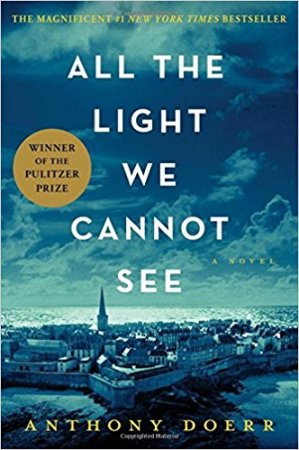 All the Light We Cannot See
All the Light We Cannot See About Grace
About Grace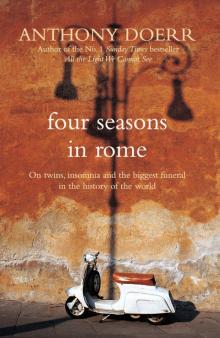 Four Seasons in Rome: On Twins, Insomnia, and the Biggest Funeral in the History of the World
Four Seasons in Rome: On Twins, Insomnia, and the Biggest Funeral in the History of the World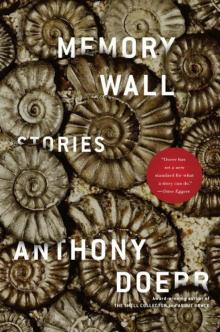 Memory Wall
Memory Wall The Best American Short Stories 2019
The Best American Short Stories 2019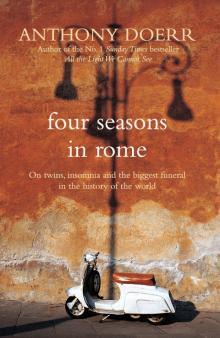 Four Seasons in Rome
Four Seasons in Rome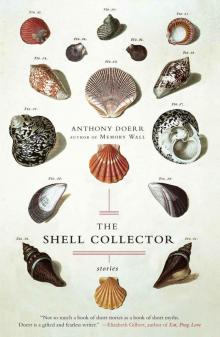 The Shell Collector
The Shell Collector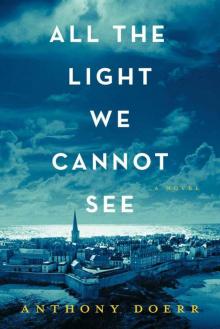 All the Light We Cannot See: A Novel
All the Light We Cannot See: A Novel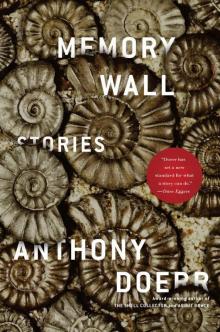 Memory Wall: Stories
Memory Wall: Stories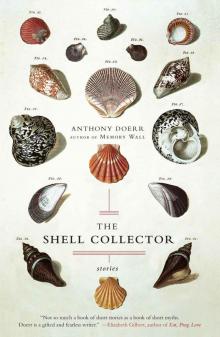 Shell Collector
Shell Collector